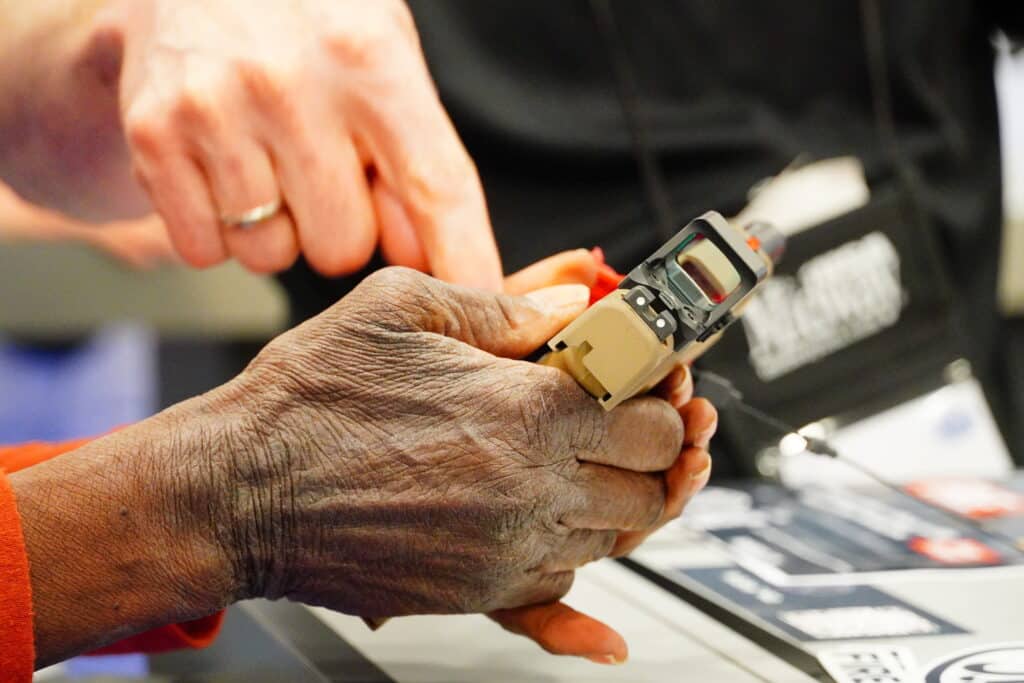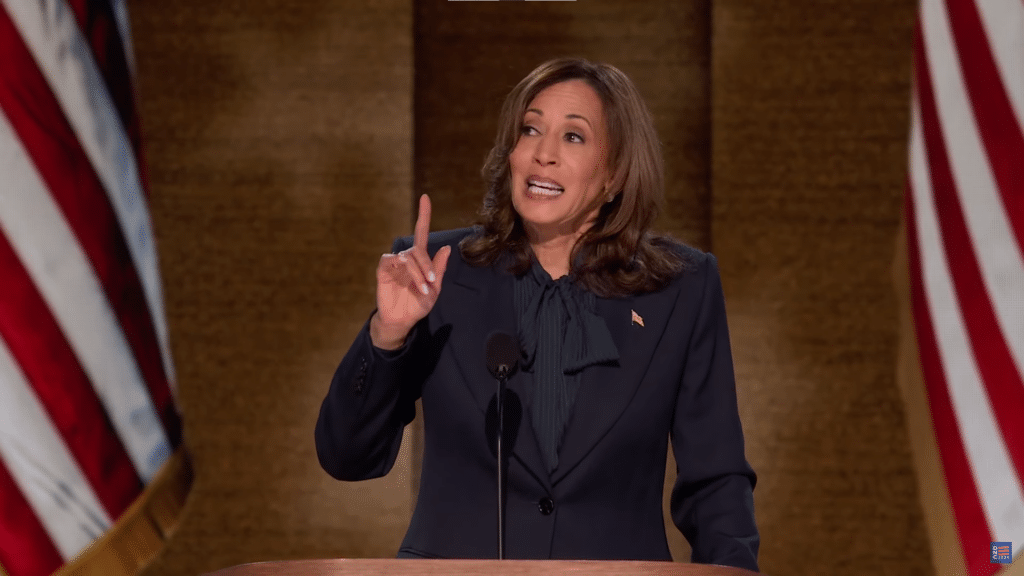Two weeks ago, I asked whether a mass shooting would bring more attention to guns and change the presidential race. Since then, we’ve experienced a mass shooting at a Georgia high school and a debate. So far, it seems the shooting hasn’t changed much.
While Donald Trump and Kamala Harris argued over the latter’s walkback on a mandatory buyback of “assault weapons,” which had Harris reminding everyone of her own gun, there hasn’t been much discussion of gun policy. Contributing Writer Jake Fogleman suggests the lack of attention may actually be caused by a lack of interest from voters rather than the other way around. After all, the latest polling suggests everyone has heard of the Georgia shooting, but almost nobody lists guns as their top issue.
Speaking of the debate, we’re talking about it on the podcast. Semafor’s Dave Weigel joins the show for the first time to analyze the impact guns are having on the race.
We also talked a bit about how Harris might use her gun ownership to her advantage between now and election day. And the limits of how much that will really matter, which happens to be the topic of my analysis piece this week as well.

Analysis: Are Voters De-Prioritizing Guns? [Member Exclusive]
By Jake Fogleman
Gun policy has played a fairly limited role in the 2024 election compared to years past. Voters may have largely tuned out.
A new poll from The Economist/YouGov last week identified a modest uptick in support for certain gun-control measures in the aftermath of the Apalachee High School shooting in Winder, Georgia. Despite a horrific mass shooting clearly being fresh on the minds of respondents to the survey (90 percent said they were familiar with the incident), they nonetheless listed guns as a bottom-tier issue. Only four percent said it was their most important issue, placing it squarely in the bottom third of the options listed.
That finding continues a recent trend. A Fox News poll last month showed that the issue is far from top-of-mind for most voters. Just three percent of respondents said guns would be the most important issue in deciding their vote for President, the least cited issue polled. An NBC News poll released earlier this month of Gen Z voters, who have sometimes prioritized gun laws more than other generations, also found that gun policy ranks dead last among issues that matter most to their vote.
Now, it is true that guns have rarely been the top issue on voters’ minds in most elections. “It’s the economy, stupid,” became a political cliché for a reason, as voters have consistently placed kitchen table issues like employment, inflation, and economic opportunity above most others. Yet, it was not that long ago that guns were also given considerable weight by American voters, including in the last federal election season.
An August 2022 AP-NORC poll found “gun violence” trailed only inflation as the issue Americans viewed as the biggest problem heading into the midterm election that year. Similarly, an August 2022 Pew survey analyzing midterm election issues found 62 percent of voters then said that “gun policy” was very important to their vote that year—second only to the economy in a list of options that included perennial hot-button subjects like immigration, abortion, violent crime, health care, and more. Even as recently as last spring, a Fox News survey of registered voters found that “gun control/violence” was the third most commonly cited issue ranked in terms of importance behind the economy and inflation.
There has been a noticeable lack of attention to guns in the 2024 election cycle. The issue never came up during the GOP primary, even as Former President Donald Trump was vulnerable on the issue from the right. After securing the nomination, the Trump team removed nearly all mentions of guns and gun policy from the Republican party platform. He also didn’t talk about gun rights issues at all during his acceptance speech at the RNC, nor did the convention feature any gun rights speakers as it had in years past.
It also wasn’t brought up in the debate between Trump and President Joe Biden.
The debate between Trump and Vice President Kamala Harris, held shortly after the Georgia school shooting, had guns come up but not directly. Gun policy wasn’t given its own dedicated question by the ABC News debate moderators. Instead, it was relegated to a brief exchange between the candidates in an aside over Harris’ past position on mandatory AR-15 buybacks.
That may be because the GOP is currently de-prioritizing guns alongside other social issues, like abortion and gay marriage. But it might just be that the lack of emphasis on guns is coming from the bottom up.
The 2022 election is illustrative for potentially explaining voters’ attention shift.
The midterms came on the heels of one of the most tumultuous and eventful periods for guns and American society in recent history. The years that immediately preceded had simultaneously seen a record-setting stretch of gun sales among Americans overall, as well as to first-time gun buyers. Murder rates had just spiked to levels not seen in this country in decades. Incidences of horrific mass gun violence, including the murder of 19 children at an elementary school in Uvalde, gripped the nation. The President signed the first new federal gun-control law in nearly 30 years. The Supreme Court handed down a landmark Second Amendment decision recognizing a right to carry firearms in public for self-defense. The House of Representatives passed an “assault weapon” ban for the first time since 1994.
By contrast, 2024 has been almost historically quiet on that front.
Murder appears to be on a rapid decline for the second year in a row. Gun sales, while still slightly elevated above pre-pandemic levels, are nowhere near where they were between 2020-2022. Divided control of Congress has ensured no further legislative advancements of any new gun restrictions. The group most likely to raise the salience of guns in past election cycles, the NRA, has found itself severely diminished after an adverse ruling in its corruption case. And until last week in Georgia, there had not been a single mass shooting that meets the Violence Project’s definition of four or more people killed in a random public attack—precisely the sort of incidents that have tended to put guns back in the national conversation.
So it perhaps shouldn’t be much of a surprise that guns have played a less prominent role this election season than in years past.
Podcast: Semafor’s Dave Weigel on the Debate and Harris’s Handgun [Member Early Access]
By Stephen Gutowski
This week, we’re reacting to the debate. That’s why I’ve got one of the top political reporters in the country on the show.
Dave Weigel is a writer for Semafor, who runs their Americana newsletter. He has been covering national politics across major outlets for decades now. He is one of the best-sourced reporters out there.
He said Kamala Harris bringing up her gun ownership at the debate was a bit of a surprise since she hasn’t talked much about that before. He agreed the fact she owns a handgun for self-defense could make her more relatable to the average gun owner than Tim Walz, who centers his gun ownership around hunting. But he doubted that would become a major part of her campaign going forward.
Weigel said guns have been a relatively minor issue in the election thus far. He said that was likely due to two factors. One is the relative lack of high-profile shootings. The other is the limits on what gun control is even possible under the Supreme Court’s Bruen precedent.
You can listen to the show on your favorite podcasting app or by clicking here. Video of the episode is available on our YouTube channel. An aut0-generated transcript is available here. Reload Members get access on Sunday, as always. Everyone else can listen on Monday.
Plus, Contributing Writer Jake Fogleman and I discuss my time in Texas covering the NRA’s latest board meeting, where the group came to an agreement on a reform plan but failed to overhaul its legal strategy after a marathon executive session. We also discuss new corruption allegations against the group in a recently filed lawsuit from a former employee, as well as the group’s first big election ad buy of the cycle. Finally, we cover new evidence of a modest bump in support for stricter gun laws in the aftermath of the Georgia shooting.

Analysis: Does Kamala Harris Owning a Gun Matter? [Member Exclusive]
By Stephen Gutowski
During a contentious fight over guns at Tuesday’s debate with Donald Trump, Kamala Harris brought up a little-discussed fact to defend her position: she is a gun owner.
“This business about taking everyone’s guns away; Tim Walz and I are both gun owners. We’re not taking anyone’s guns away,” Harris said in response to Trump on Tuesday. “So, stop with the continuous lying about this stuff.”
That’s a new tactic for Harris in her effort to reassure voters she’s more moderate than her record and previous run for president might imply. But will it have much effect?
First off, while this is a new tactic for Harris, it isn’t a new tactic among Democrats. President Joe Biden has often emphasized his gun ownership, and dubious self-defense advice, as a way of softening or justifying his calls for stricter gun laws. In fact, the Harris Campaign has leaned heavily into Minnesota Governor Tim Walz’s history of hunting with shotguns.
However, it presents a bit of a twist to that formula that she reportedly owns a handgun. And she said she owns it explicitly for self-defense rather than hunting.
“I am a gun owner, and I own a gun for probably the reason a lot of people do – for personal safety,” she said during an April 2019 event. “I was a career prosecutor.”
But it’s unlikely the high-profile mention that she owns a gun, even a handgun, will shake up how gun voters view the race. But it isn’t necessarily meant to do that. Instead, it’s an effort to reassure gun owners who don’t vote exclusively on gun politics.
Just as with her numerous other flip-flops, pointing to her own gun ownership as a parry for Trump’s assertion she would “confiscate everyone’s gun” is an attempt to redefine herself in the midst of a lightning campaign.
The debate exchange originated from comments Harris made during her unsuccessful 2019 presidential campaign. She was one of several Democratic primary candidates who supported a mandatory buyback of at least some firearms. Her proposal focused on requiring owners to turn in their so-called assault weapons, which are generally defined as semi-automatic firearms capable of accepting detachable magazines and featuring certain banned features–often including popular rifles like the AR-15.
“We have to have a buyback program, and I support a mandatory gun buyback program,” she said at an October 2019 forum.
However, her campaign walked back that support shortly after she took over the top position on the Democratic ticket.
“Correct, the VP will not push for a mandatory buy back as president,” Lauren Hitt, a Harris spokesperson, told The Reload in July. “She has expressed support for red flag laws, universal background checks and an assault weapons ban.”
Her walk back, however effective it might be, doesn’t extend very far. She still supports a ban on the sale of AR-15s and similar firearms. She still wants to extend background checks to non-commercial private gun sales. She still wants some kind of national extreme risk protection order law.
Then there’s her track record.
Despite buying a handgun during her time as a prosecutor, she has either argued for or implemented strict regulations on their ownership. When she was the District Attorney of San Francisco, Harris signed on to a Supreme Court brief arguing Washington, DC’s total ban on civilian handgun ownership didn’t violate the Second Amendment. When she moved up to California Attorney General a few years later, she activated the state’s microstamping requirement for new handguns–which effectively banned the sale of new models until a federal court struck it down about a decade later.
That all likely limits whatever upside there is for her touting her gun ownership.
To see if it has much effect, of course, she’ll have to lean into it. There’s a good reason most people probably didn’t realize or forgot that she was a gun owner. She hasn’t talked about it much at all to this point.
While they’ve made Walz’s gun ownership and hunting a major part of his biography at the DNC, the Harris Campaign didn’t even mention she owns one. After she mentioned it herself at the debate, her campaign didn’t respond to requests for more details on the gun she owns.
Harris has an opportunity to play up her gun ownership a lot more in the coming weeks if she wants to do so. Talking about how she bought a handgun for self-defense is probably going to do more to connect with the average gun owner than talking about Walz’s hunting trips. Far more Americans own handguns than hunting firearms, and far more say they own them for self-defense.
She can also contrast her gun ownership against Trump’s lack thereof. After all, it was a bit surprising to find out early this year that he also personally owns guns. While his sons are avid shooters, there’s little evidence Trump shares that passion. There doesn’t even appear to be a publicly-available picture of Trump shooting a gun himself.
But it came out that he does own at least three guns as part of a CNN story that he’d turned over two to the New York Police Department earlier this year in the wake of his felony convictions. Trump can’t legally possess firearms anymore because of those convictions. It’s not difficult to see how she could play up the difference between the two of them.
It probably wouldn’t take her very far to put a lot of time and energy into this contrast, though. She’s already using more direct attacks on his convictions and other alleged crimes. And there’s probably little room for improvement among the voters who value gun ownership.
While Trump’s appeal among gun voters is partially driven by a certain kind of macho image, it is primarily due to his reputation for defending gun rights. Though there are flaws in his pro-gun record–like the unconstitutional bump stock ban, he has real accomplishments that gun voters care about–like appointing three of the justices in the majority of the Bruen decision. Harris clearly isn’t doing much to try and win away people who are going to vote based on pro-gun policies and is unlikely to make up ground with them by emphasizing her gun ownership.
Still, she could make inroads with gun owners who relate to her desire for self-protection and don’t feel strongly about restrictions they don’t think will impact them. The question of how many voters in that block are still undecided or unenthusiastic about voting for Harris will probably determine how much more she talks about her handgun.
That’s it for now.
I’ll talk to you all again soon.
Thanks,
Stephen Gutowski
Founder
The Reload







